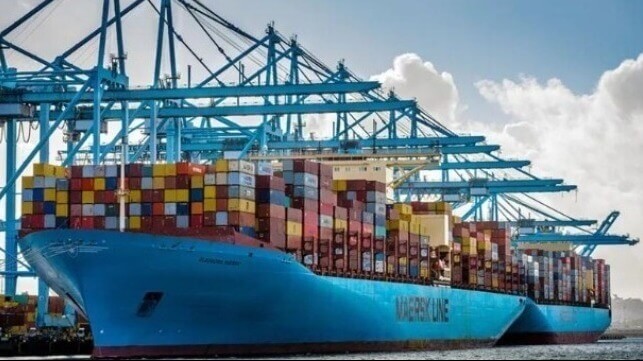Maersk Contracts China’s Xinya for First Methanol Dual-Fuel Retrofit

Maersk is moving forward with the company’s planned conversion of one of its in-service containerships to become the first retrofitted dual-fuel methanol containership. The company announced in June 2023 working with MAN it was preparing plans to proceed with the first conversion as part of an effort to demonstrate the potential for the existing fleet.
In an elaborate ceremony in Zhoushan, China on October 18, Maersk and the Zhoushan Xinya Shipbuilding Company celebrated the signing of the contract for the conversion project. Xinya reports it won the bid for the project on September 27, building on its experience working with Maersk in the past. The yard also has a relationship with MAN. The yard is hailing the contract as a “milestone event in the history of Xinya.”
Government officials attending the ceremony highlighted that Xinya is one of the few shipyards with ship repair capabilities and qualifications working with LNG-fueled ships in the past. It is also one of China’s private enterprise companies.

The contract was signed in China on October 18 (Xinya)
The project is scheduled to proceed in mid-2024, and although Maersk and the shipyard did not officially announce the vessel’s identity, Chinese media reports are saying the Maersk Halifax (178,257 dwt) was selected as the first vessel to undergo the conversion. MAN PrimeServ, the after-sales division of MAN Energy Solutions, reported in June that the agreement would cover 11 vessels, which is consistent with Maersk’s H-Class. The vessels were built between 2017 and 2019 in South Korea by Hyundai Heavy Industries. Each is 1,158 feet in length with a capacity of 15,226 TEU.
The Maersk Halifax comes with a history as the vessel, which was delivered in 2017 as one of the first of the class, became a casualty in March 2018. During a significant container fire aboard four crewmembers were killed. The vessel was later salvaged and extensively rebuilt with a new forward section. Maersk had said the retrofit of the first vessel and a later sister ship would be timed to a special survey.
Maersk said that concurrently with the development of the designs for the first methanol dual-fuel vessels, currently under construction in South Korea, it also began exploring the potential in retrofitting vessels with dual-fuel methanol engines. MAN ES is also working extensively on the parameters for these conversions. Hapag-Lloyd working with Seaspan has also contracted with MAN for dual-fuel engine refits.
“Retrofitting a MAN B&W engine to dual-fuel running is straightforward as our standard, electronically-controlled ME-C diesel engines are constructed as ‘dual-fuel ready’ and therefore readily retrofittable,” commented Klaus Rasmussen, Head of Projects and PVU Sales at MAN PrimeServ, when the contract was announced in June 2023. He noted that this project will be the first-ever methanol retrofits performed on two-stroke engines.
The conversion to the engine making it able to operate on methanol, Maersk reports will be part of a larger project. The retrofit will also include new fuel tanks, a fuel preparation room, and a fuel supply system. They said in June they were working on the detailed engineering for the project.

that matters most
Get the latest maritime news delivered to your inbox daily.
The vessels are currently equipped with MAN B&W 8G95ME-C9.5 prime movers. They will be retrofitted to dual-fuel MAN B&W 8G95ME-LGIM10.5 types capable of operation on fuel oil/methanol.
None of the parties involved in the project have discussed the cost of the refit. Michael Petersen, Senior Vice President and head of MAN PrimeServ in Denmark in June said that similar retrofits to dual-fuel had enabled shipowners to maintain their assets’ value and avoid building additional tonnage.
